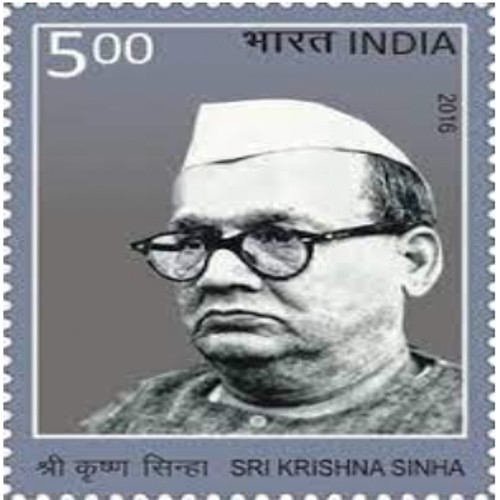Early Life
Krishna Sinha was born on 21 October 1887 in Khanwa in Nawada district of Bihar. He completed his schooling at the Zila School in Munger district of erstwhile Bihar. Subsequently he pursured law at Patna University.
Role in India’s Independence Movement
Sinha played a key role in the success of the Non-Cooperation, Satyagraha and Civil Disobedience movements in Bihar. He was imprisoned several times and spent a total of nearly eight years in prison.
Along with his participating the independence struggle, Sinha also contributed as an able administrator and legislator. He served as a member of the Legislative Council in 1927 Sinha later became the General Secretary of Bihar Pradesh Congress Committee (BPCC) in 1929 and was made the President in 1936. He was appointed as the Premier of Bihar province in 1946 when the Indian National Congress came to power in the state of Bihar. Sinha later resigned in protest over the question of British involving India in the Second World War without the consent of the Indians.
Contribution to Constitution Making
Sinha was elected to the Constituent Assembly from the Province of Bihar on a Congress party ticket. In the Assembly, he took part in discussions relating to the Objective Resolutions introduced by Nehru.
Later Contributions
Sinha played an important political role in Bihar post independence as well. He was appointed as the first Chief Minister of Bihar. Sinha was known for being the first Chief Minister of the country to abolish the zamindari system, implementing river valley projects in Koshi, Aghaur and Sakri and also introducing heavy industries like oil refining and fertiliser production in Bihar.
He passed away on 31 January 1961.
- Sinha contributed to the discussion on the Objectives Resolution introduced by Jawaharlal Nehru. He felt that it was important to give the people of the country an idea about what the Constitution sought to achieve. Sinha believed that the resolution was in the best interests of the whole nation and stated that the absence of Muslim League members should not stall the passing of the resolution.
- He also highlighted the transfer of power to the Constituent Assembly by the British denotes the success of the Indian independence movement and not a result of British benevolence.
- Activities of Dr. Shri Krishna Singh in Provincial Politics (1919-1947), Punil Kumar Jha
- Shri Krishna Sinha: A Biography, Ramacandra Prasad and Ashok kumar Sinha

